The public sees a number of specific problems with American politics. Partisan fighting, the high cost of political campaigns, and the outsize influence of special interests and lobbyists are each seen as characteristic of the U.S. political system by at least 84% of Americans.
Yet 63% also say that “ordinary Americans care about making the political system work well” is a good description of U.S. politics today. Still, when asked to describe a strength of the political system in their own words, more than half either say “nothing” (22%) or decline to give an answer (34%).
Americans view negative statements as better descriptions of the political system than positive ones
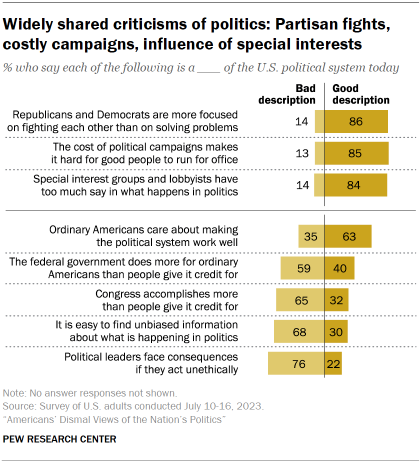
More than eight-in-ten adults say that each of the following is at least a somewhat good description of the U.S. political system today:
- Republicans and Democrats are more focused on fighting each other than on solving problems (86%);
- The cost of political campaigns makes it hard for good people to run for office (85%);
- Special interest groups and lobbyists have too much say in what happens in politics (84%).
About six-in-ten (63%) think ordinary Americans want to make the political system work well. This is the rare positive sentiment that a majority views as a good descriptor of the political system.
Fewer than half of adults hold the view that the government deserves more credit than it gets: Majorities say that “the federal government does more for ordinary Americans than people give it credit for” (59%) and “Congress accomplishes more than people give it credit for” (65%) are both bad descriptions of the political system.
Nearly seven-in-ten adults express frustration with the availability of unbiased information about politics: 68% say the statement “it is easy to find unbiased information about what is happening in politics” is not a good description of the political system.
And just 22% of Americans say that political leaders facing consequences for acting unethically is a good description of the political system. They are more than three times as likely to say that this is a bad description (76% say this).
Many critiques of the political system are bipartisan
Partisans have similar views of many of the descriptions of the political system included in the survey.
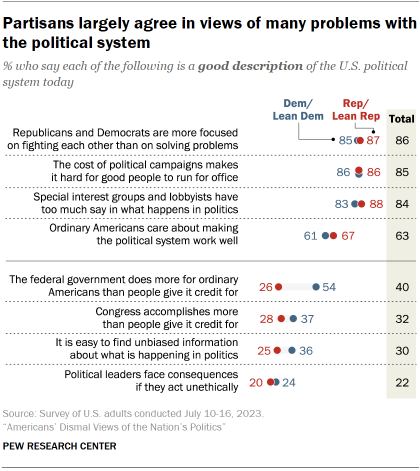
Overwhelming majorities in both parties think there is too much partisan fighting, campaigns cost too much, and lobbyists and special interests have too much say in politics. And just 24% of Democrats and Democratic-leaning independents and 20% of Republicans and Republican leaners say that political leaders face consequences if they act unethically.
The widest partisan gap is over a description of the federal government. Democrats are roughly twice as likely as Republicans to say “the federal government does more for ordinary Americans than people give it credit for” (54% vs. 26%).
There is a narrower gap in views of Congress’ accomplishments: 37% of Democrats and 28% of Republicans say it accomplishes more than people give it credit for.
Democrats are also more likely to say, “It is easy to find unbiased information about what is happening in politics” (36% of Democrats and 25% of Republicans say this is a good description of the political system today), while Republicans are slightly more likely than Democrats to view ordinary Americans as wanting to make the political system work well (67% of Republicans and 61% of Democrats say this is a good description).
In their own words: Americans on the political system’s biggest problems
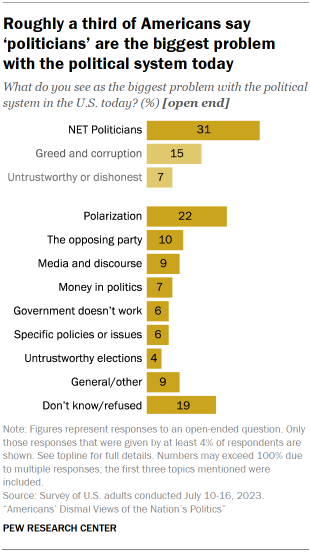
When asked to describe in their own words the biggest problem with the political system in the U.S. today, Americans point to a wide range of factors.
Negative characteristics attributed to politicians and political leaders are a common complaint: 31% of U.S. adults say politicians are the biggest problem with the system, including 15% who point to greed or corruption and 7% who cite dishonesty or a lack of trustworthiness.
The biggest problem, according to one woman in her 50s, is that politicians are “hiding the truth and fulfilling their own agendas.” Similarly, a man in his 30s says, “They don’t work for the people. They are too corrupt and busy filling their pockets.”
Explore more voices: The political system’s biggest problems
What do you see as the biggest problem with the political system in the U.S. today?
“An almost total lack of credibility and trust. Coupled with a media that’s so biased, that they’ve lost all objectivity.” –Man, 70s
“Lying about intentions or not following through with what elected officials said they would do.” –Woman, 20s
“Blind faith in political figures.” –Woman, 50s
“Our elected officials would rather play political games than serve the needs of their constituents.” –Woman, 50s
“Same politicians in office too long.” –Woman, 30s
“Extremism on both sides exploited by the mainstream media for ratings. It is making it impossible for both parties to work together.” –Man, 30s
“It has become too polarized. No one is willing to compromise or be moderate.” –Woman, 40s
“Too much money in politics coming from large corporations and special interest.” –Man, 30s
“The people have no say in important matters, we have NO representation at all. Our lawmakers are isolated and could care less what we want.” –Man, 60s
About two-in-ten adults cite deep divisions between the parties as the biggest problem with the U.S. political system, with respondents describing a lack of cooperation between the parties or among elected leaders in Washington.
“Both of the political parties are so busy trying to stop the other party, they are wasting their opportunities to solve the problems faced by our nation,” in the view of one man in his 70s.
Even as some blame polarization, others (10% of respondents) identify the other party as the system’s biggest problem. Some Republicans say that the biggest problem is “Democrats” while some Democrats simply say “Republicans.”
Smaller but substantial shares of adults name the media and political discourse (9%), the influence of money in politics (7%), government’s perceived failures (6%), specific policy areas and issues (6%) or problems with elections and voting (4%) as the biggest problem with the political system today.
In their own words: Americans on the political system’s biggest strengths
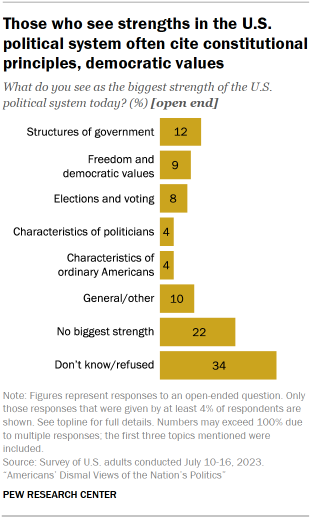
Far fewer adults name a specific strength of the political system today when asked to describe the system’s biggest strength in their own words. More than half either say that the system lacks a biggest strength (22%) or decline to answer (34%). As one woman in her 60s writes, “I’m not seeing any strengths!”
Among those who do identify strengths of the U.S. political system, the structure of political institutions and the principles that define the constitutional order are named most frequently (by 12% of respondents). Many respondents specifically point to the Constitution itself or refer to the separation of powers or the checks and balances created by the Constitution.
A man in his 20s believes that the “separation of powers and federalism work pretty well,” while one in his 30s writes that the system’s greatest strength is “the checks and balances to make sure that monumental changes aren’t made unilaterally.”
Explore more voices: The political system’s biggest strengths
What do you see as the biggest strength of the U.S. political system today?
“Everyone getting a say; democracy.” –Woman, 40s
“The right to have your opinions heard.” –Man, 60s
“In spite of our differences, we are still a democracy, and I believe there are people within our government who still care and are interested in the betterment of our country.” –Woman, 50s
“The freedom of speech and religion” –Woman, 50s
“If we have fair, honest elections we can vote out the corruption and/or incompetent politicians.” –Man, 70s
“The Constitution.” –Man, 50s
“The checks and balances to control the power of any office. The voice of the people and the options to remove an official from office.” –Man, 60s
“New, younger voices in government.” –Woman, 40s
“If we can’t get more bipartisanship we’ll become weaker. Our biggest strength is our working together.” –Woman, 60s
“The way that every two years the people get to make their voice heard.” –Man, 30s
About one-in-ten (9%) refer to individual freedoms and related democratic values, while a similar share (8%) discuss the right to vote and the existence of free elections. A woman in her 70s echoes many similar comments when she points to “the possibility of change in upcoming elections.”
However, even some of the descriptions of positive characteristics of the system are couched in respondents’ doubts about the way the system is working today. One woman in her 50s adds a qualification to what she views as the system’s biggest strength, saying, “Theoretically every voter has a say.”
Smaller shares of the public point to the positive characteristics of some politicians (4%) or the positive characteristics of the American people (4%) as reasons for optimism.
Are there clear solutions to the nation’s problems?
The public remains roughly evenly split over whether there are clear solutions to the biggest issues facing the country. Half of Americans today say there are clear solutions to most of the big issues facing the country, while about as many (48%) say most big issues don’t have clear solutions.
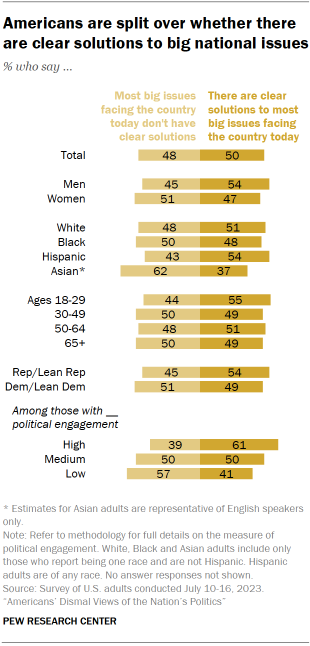
There are relatively modest demographic and political differences in perceptions of whether the solutions to the nations’ problems are clear or not.
Gender
While both men and women are relatively divided on this question, women are 6 percentage points more likely to think the big issues facing the country don’t have clear solutions.
Race and ethnicity
While 43% of Hispanic adults and about half of Black (50%) and White (48%) adults say there aren’t clear solutions for most big issues, that rises to 62% among Asian adults.
Age
Age differences on this question are modest, but those under 30 are slightly more likely than those 30 and older to say most big issues have clear solutions.
Partisanship and political engagement
Both Republicans and Democrats are relatively split on this question, though Republicans are slightly more likely to say there are clear solutions to most big issues.
Those with higher levels of political engagement are more likely to say there are clear solutions to most big issues facing the country.
About six-in-ten adults with high levels of political engagement (61%) say there are clear solutions to big issues today, compared with half of those with medium levels of engagement and 41% of those with lower engagement.


